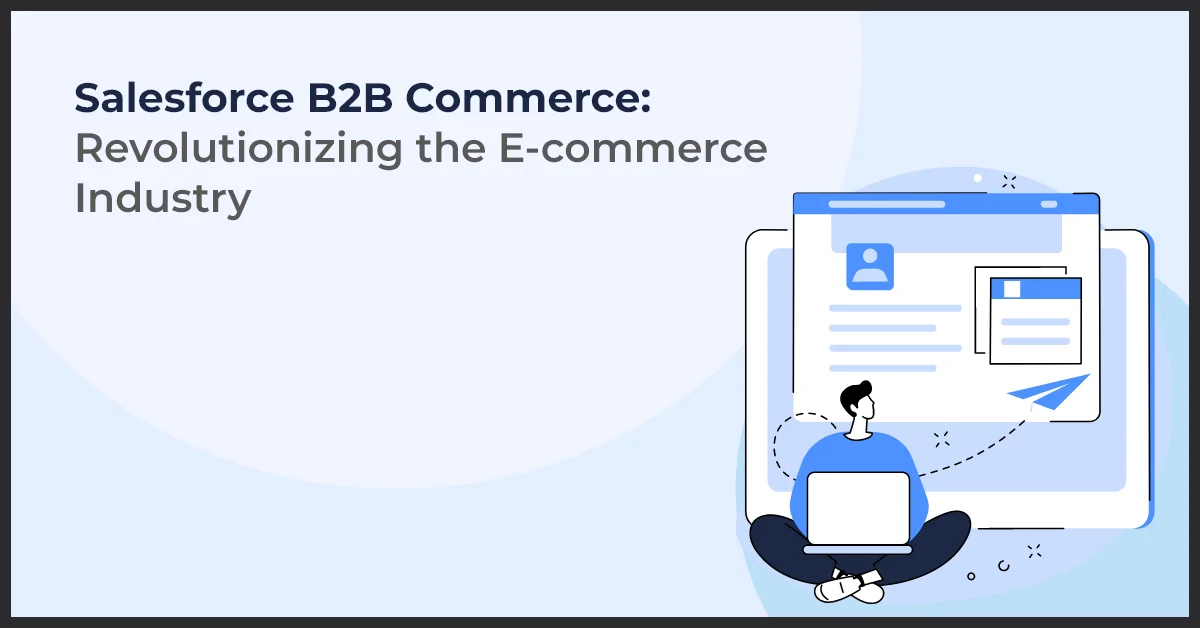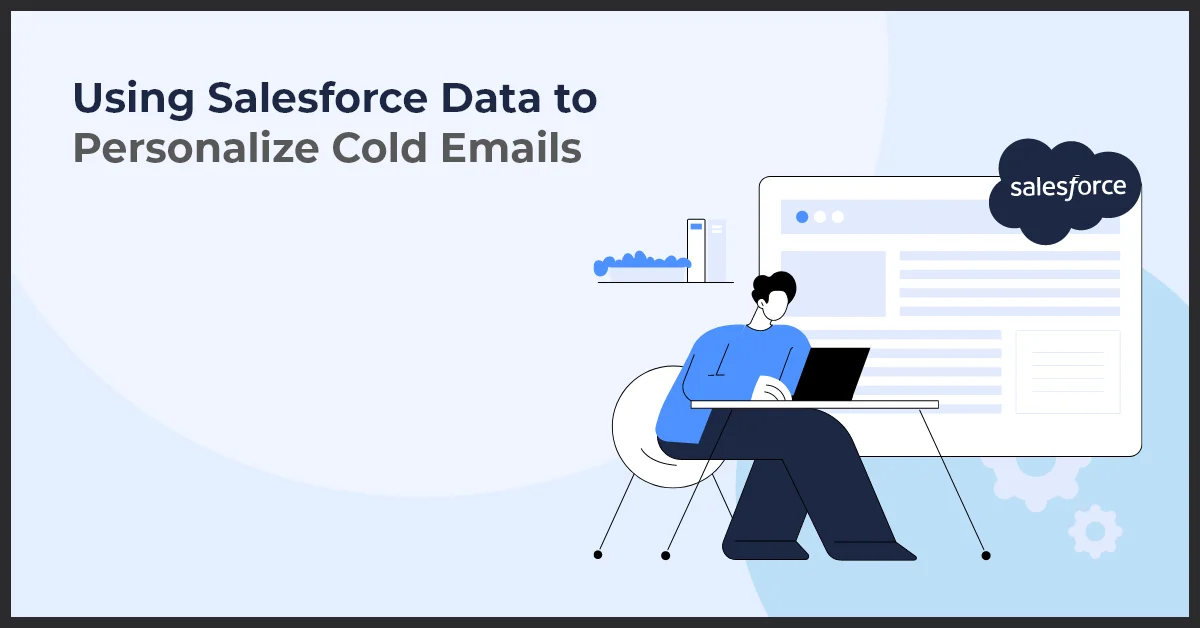Salesforce B2B Commerce: Revolutionizing the E-commerce Industry

Published on: November 23, 2023
Updated on: June 27, 2024
799 Views
- Salesforce
12 min read
Salesforce B2B Commerce is a cutting-edge platform revolutionizing the e-commerce industry by combining the power of Salesforce's robust customer relationship management (CRM) system with specialized features tailored for business-to-business (B2B) transactions. A reliable B2B commerce solution is essential for businesses striving to excel online.
Salesforce B2B Commerce enables companies to offer their B2B customers a seamless, personalized, and streamlined buying experience. The platform empowers businesses to create unique, branded storefronts, customize pricing and product catalogs, launch tailored marketing campaigns, and provide flexible payment and shipping options.
The significance of Salesforce B2B Commerce lies in its ability to simplify complex B2B transactions, enhance customer satisfaction, and drive revenue growth. Leveraging Salesforce's CRM functionalities, businesses can seamlessly manage customer interactions, track sales activities, and gain valuable insights to refine their B2B commerce strategies.
Whether you are a wholesaler, distributor, or manufacturer, embracing Salesforce B2B Commerce can propel your e-commerce business to new heights. Stay ahead of the competition, deliver exceptional customer experiences, and unlock the true potential of B2B commerce with Salesforce.
Understanding B2B Commerce
B2B commerce, or business-to-business commerce, refers to the buying and selling of goods and services between businesses rather than between a business and individual consumers. This type of commerce involves transactions between manufacturers, wholesalers, retailers, or businesses in different industries.
One key difference between B2B and B2C commerce is the target audience. B2B commerce focuses on meeting the needs of businesses, while B2C commerce caters to individual consumers. In B2B commerce, stakeholders such as procurement teams or decision-makers typically make purchase decisions.
In addition to this, B2B commerce provides several advantages for businesses. It facilitates larger order volumes and higher transaction values compared to B2C commerce. B2B transactions often involve bulk buying, contributing to increased revenue. Moreover, B2B commerce allows companies to cultivate enduring relationships with their customers. Building strong relationships founded on trust and reliability is crucial in B2B commerce, frequently resulting in repeat business and customer loyalty.
Introduction to Salesforce
Salesforce is a leading cloud-based software company that offers a comprehensive suite of business solutions to organizations of all sizes. Focusing on customer relationship management (CRM), Salesforce empowers businesses to strengthen their relationships with customers, streamline operations, and drive growth.
Renowned as a pioneer in cloud computing, Salesforce provides a range of products and services to help businesses across various industries succeed in the digital age. With its innovative software-as-a-service (SaaS) approach, the company enables organizations to access powerful tools and resources without needing extensive hardware or software infrastructure.
Overview of Salesforce's Cloud-Based Solutions
Salesforce offers a wide range of cloud-based solutions that cater to businesses' diverse needs. From sales and marketing to service and analytics, the company's platform is designed to support every aspect of the customer lifecycle.
The Sales Cloud facilitates efficient sales process management, lead tracking, and accelerated deal closures. Meanwhile, the Marketing Cloud empowers organizations to create personalized campaigns, engage customers across multiple channels, and drive revenue growth. Additionally, the Service Cloud ensures exceptional customer service experiences, efficient issue resolution, and long-lasting customer loyalty.
Highlighting the company's expertise in customer relationship management (CRM)
One of Salesforce's core strengths is its customer relationship management (CRM) expertise. With its CRM platform, businesses can gain a holistic view of their customers, understand their needs and preferences, and develop personalized strategies to meet their expectations.
Salesforce's CRM capabilities can enhance sales processes, improve responsiveness to customer inquiries, and deliver top-notch service across all channels. The company's CRM solutions enable organizations to streamline operations, increase productivity, and make data-driven decisions to drive better business outcomes.
Importance of Salesforce B2B Commerce for Businesses
Salesforce B2B Commerce offers a range of benefits and solutions that can significantly impact businesses and their digital commerce strategies. Here are some key reasons why Salesforce B2B Commerce is essential for businesses:
Streamlining Digital Commerce Solutions
One of Salesforce B2B Commerce's primary advantages is its ability to streamline digital commerce solutions. Businesses can consolidate their various sales channels by providing a comprehensive platform, making managing and optimizing their digital presence easier. This streamlining process allows for greater efficiency and effectiveness in handling online transactions, improving sales performance and customer satisfaction.
Sales Automation and Order Management Systems
With Salesforce B2B Commerce, businesses can automate their sales processes and implement effective order management systems. This allows for smoother communication and collaboration between different departments within the organization. Sales teams can easily track and manage orders, leading to quicker order processing and fulfillment. This automation improves operational efficiency and reduces the potential for human error, ultimately enhancing the overall sales cycle.
Significance of Customer Data Management for Customized B2B Experiences
Customer data is a valuable business asset, and Salesforce B2B Commerce recognizes its importance. Businesses can leverage the platform's robust customer data management capabilities to provide personalized and customized experiences for their B2B customers. This includes tailoring product recommendations, pricing, and promotions based on individual customer preferences and behavior. Such customized experiences strengthen customer relationships and drive higher conversion rates and long-term customer loyalty.
Key Features of Salesforce B2B Commerce
Salesforce B2B Commerce transforms businesses with robust e-commerce, integrated CRM, strategic online sales tools, user-friendly website development, streamlined order management, and team-aligned marketing. Here are some transformative features by Salesforce that can redefine your business operations:
- E-commerce platforms: Salesforce B2B Commerce provides a robust platform for creating and managing your online store. It lets you showcase and sell your products quickly to your business customers.
- Customer relationship management (CRM): With Salesforce's integrated CRM, you can efficiently manage all aspects of your customer relationships, from contact and account management to sales tracking and customer service.
- Online sales strategies: Salesforce B2B Commerce offers a range of tools and features to boost your online sales, such as personalized product recommendations, targeted promotions, and smart pricing options.
- E-commerce website development: With Salesforce B2B Commerce, you can easily build and customize your e-commerce website, ensuring a seamless and user-friendly shopping experience for your B2B customers.
- Order management systems: Salesforce's order management capabilities allow you to streamline your order processing, inventory management, and fulfillment, ensuring timely delivery and customer satisfaction.
- Customer data management: Salesforce B2B Commerce enables you to effectively collect, analyze, and leverage customer data, allowing you to personalize your marketing efforts, improve customer engagement, and drive sales.
- B2B marketing and sales alignment: With Salesforce B2B Commerce, you can align your marketing and sales teams, enabling them to collaborate and cohesively work towards driving revenue and achieving business goals.
How Salesforce B2B Commerce Enhances B2B Sales
Salesforce B2B Commerce is a powerful tool that supports businesses in their B2B sales process. Its robust features and capabilities enable organizations to streamline their sales operations, drive revenue growth, and provide an exceptional experience to their B2B customers.
One of Salesforce B2B Commerce's key aspects is its emphasis on customization and personalization. B2B customers have unique needs and preferences, and Salesforce B2B Commerce allows businesses to tailor their offerings to meet these specific requirements. By providing a personalized experience, businesses can attract and retain their B2B customers, increasing sales.
Moreover, Salesforce B2B Commerce is crucial in delivering exceptional customer service. It enables businesses to provide real-time access to vital information, such as product availability, pricing, and order tracking. This transparency and accessibility enhance the overall buying experience for B2B customers, fostering trust and loyalty.
Additionally, Salesforce B2B Commerce allows businesses to automate repetitive tasks like quote generation, order processing, and inventory management. By automating these processes, sales teams can focus on building meaningful customer relationships and driving sales growth.
Implementing Salesforce B2B Commerce
A step-by-step guide to implementing Salesforce B2B Commerce for businesses
Implementing Salesforce B2B Commerce for your business can be a game-changer. Here is a step-by-step guide to help you get started:
- Evaluate your Business Needs and Objectives: Before implementing Salesforce B2B Commerce, clearly understanding your business needs and objectives is essential. Identify the specific pain points and areas where B2B Commerce can make a difference.
- Choose the Right Salesforce B2B Commerce Plan: Salesforce offers different plans to meet the needs of businesses of all sizes. Choose the plan that aligns with your requirements and budget.
- Set Up your Salesforce B2B Commerce Account: Once you have chosen the plan, set up your Salesforce B2B Commerce account by following the on-screen instructions and completing the required fields.
- Customize your B2B Commerce Settings: Tailor your B2B Commerce settings to match your business branding and requirements. Customize the appearance, layout, and functionalities to create a seamless customer shopping experience.
- Configure your Product Catalog: Upload your product catalog onto the Salesforce B2B Commerce platform. Organize your products into relevant categories and create detailed product listings to attract and engage your B2B customers.
- Set Up Your Pricing and Payment Options: Configure your pricing strategies and establish payment options for your B2B customers. Salesforce B2B Commerce provides flexible pricing rules, allowing you to define different prices based on customer groups, contracts, or discounts.
- Integrate with Existing Systems and Processes: Ensure seamless integration with existing systems by connecting your commerce platform with CRM, inventory management, and order processing systems for streamlined operations.
- Test and Launch your B2B Commerce Website: Before going live, rigorously test website functionalities, addressing any issues to ensure a smooth customer experience.
- Train your Team: Provide comprehensive training using Salesforce B2B Commerce, empowering team members with the knowledge and skills to navigate the platform, manage orders, analyze data, and deliver excellent customer service.
- Monitor and Optimize Performance: Regularly monitor your live B2B Commerce website, utilizing Salesforce's analytics tools to gain insights into customer behavior, sales trends, and areas for improvement. Continuously optimize the website for an enhanced user experience and increased sales.
Importance of seamless integration with existing systems and processes
Seamless integration with your existing systems and processes is vital to maximize the benefits of Salesforce B2B Commerce. By integrating with your CRM, inventory management, and order processing systems, you can minimize manual entry, streamline operations, and provide a unified experience to your customers.
An integrated system gives you real-time customer data, inventory levels, and order status. This empowers your team to make data-driven decisions, provide personalized experiences, and deliver prompt service to your B2B customers.
Salesforce B2B Commerce offers various integration options and supports various APIs to facilitate smooth data flow between systems. Whether leveraging Salesforce's suite of solutions or third-party applications, it ensures efficient operations and a smooth customer journey.
The Future of B2B Commerce with Salesforce
B2B commerce is undergoing transformative shifts driven by technological advancements and evolving customer expectations. Staying ahead is imperative for businesses, and Salesforce B2B Commerce, with its robust features and intuitive interface, stands poised to shape the future of B2B sales.
Upcoming Trends and Advancements in B2B Commerce
- Personalization: The future of B2B commerce lies in personalized experiences. Customers expect tailored recommendations, pricing, and product suggestions based on their unique needs. With Salesforce B2B Commerce, businesses can leverage artificial intelligence and machine learning to deliver personalized experiences at scale.
- Mobile Commerce: The rise of smartphones and tablets has revolutionized how people engage with brands. In the future, B2B commerce will shift significantly towards mobile-first experiences. Salesforce B2B Commerce enables businesses to create mobile-responsive storefronts, providing seamless shopping experiences across devices.
- Omnichannel Integration: B2B buyers now seek consistent experiences across multiple touchpoints, spanning websites, marketplaces, and social media. Salesforce B2B Commerce empowers businesses to integrate multiple channels and unify customer data for a comprehensive view of the customer journey.
- Data-driven Insights: With the increasing data availability, businesses can unlock valuable insights to drive decision-making and optimize their B2B sales strategies. Salesforce B2B Commerce offers advanced analytics capabilities, enabling companies to track key metrics, identify trends, and make data-driven decisions for future growth.
Predicted Impact of Salesforce B2B Commerce
As Salesforce B2B Commerce evolves and adapts to shifting market dynamics, its role in shaping the future of B2B sales becomes increasingly pivotal. The impact of Salesforce B2B Commerce can be seen in the following ways:
- Improved Efficiency: Salesforce B2B Commerce enables businesses to operate more efficiently by automating repetitive tasks and streamlining processes. Sales teams can focus on building relationships and closing deals, while marketing teams can create targeted campaigns based on customer insights.
- Enhanced Customer Experience: Salesforce B2B Commerce empowers businesses to deliver exceptional customer experiences at every touchpoint. From personalized recommendations to seamless self-service options, it helps companies exceed customer expectations and build long-lasting relationships.
- Accelerated Growth: With its powerful features and capabilities, Salesforce B2B Commerce provides businesses with the tools to drive growth. From attracting new customers to boosting customer loyalty and retention, it offers a comprehensive solution for B2B sales success.
Conclusion
Salesforce B2B Commerce is your strategic partner for redefining sales success. This powerhouse solution empowers businesses to revolutionize sales, elevate customer experiences, and outpace competitors. Personalized experiences, advanced analytics, and seamless integration aren't just features—they're the keys to unlocking insights, optimizing processes, and delivering unparalleled customer interactions. Amidst evolving tech landscapes, Salesforce B2B Commerce is your unequivocal path to exponential growth and triumphant success in the fiercely competitive B2B marketplace. Choose Salesforce—where innovation is your competitive advantage.



